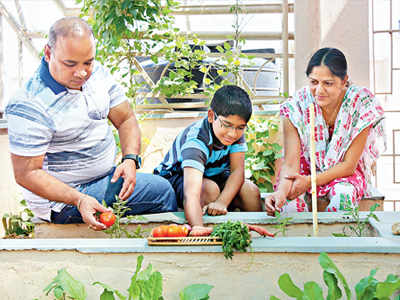- News
- lifestyle
- health-fitness
- diet
- Kolhapur opts for healthy, self grown, organic foods
Trending
This story is from April 9, 2016
Kolhapur opts for healthy, self grown, organic foods
Healthy eating is no longer a trend, but a habit that is being adapted by many.

Healthy eating is no longer a trend, but a habit that is being adapted by many. In fact, several people are taking up organic farming in their backyard or terraces and looking for alternative methods to grow vegetables. We take a look at how Kolhapuris are jumping on the organic bandwagon, be it by growing their own veggies or simply buying from organic stores.
Home grown, small scale organic gardens: Growing your own vegetables is the best bet.Ankita Burkhe plants her own vegetables on her terrace in old tubs and basins, nurtures them and serves her family not only home-cooked, but also home-grown meals. She says, “At home we have waste like used tea leaves and egg shells that can be used as manure. One can also experiment after doing some research online.” Many housewives have started opting for self-grown herbs and vegetables. Planting as many seeds as possible, dietician Jyoti Patnakar says, “Once you are into planting home-grown organic foods, then with experience you learn placement and methods. A little trial and error happens, after which curiosity leads to more research and exposure.” Jyoti Varde has a beautiful backyard and through her window you can see a rather unusual lemon tree. “I planted the seeds of a lemon I bought from a farmer’s market abroad. It turned out to be a big plant that serves more than my own family. One lemon can make upto six glasses of lemonade.” And if you don’t have big backyard, you can alsways place small bowls and old tins on your kitchen windows to grow everyday herbs.
Organic farms If you have a spare plot of land, what’s stopping you from cultivating? Architect Bina Jhanwadkar owns an organic farm where she cultivates using simple and cost-effective methods. “The first thing we did was to stop using pesticides and fertilizers and instead, invested in cows to use natural manure,” she says. Many people in the city are taking this up after consulting with experts who are trained in the field. Bina adds, “One can combine a lot of other ingrediants like channa dal and natural gud to make better fuel for manure. For big trees like mango, we use ‘gaumutra’ in old plastic bottles, and hang them on the trees to repel insects.” Rahul Kamat, an expert consultant in farming, explains, “You can grow crops that will in turn provide quality to the soil. Allowing leftovers of the crops to decay in the soil makes them natural manure for the next set of crops. This is an age-old method that’s lost because of the loss of patience and time.” Rahul also adds that the use of natural crop partners like turmeric with sugar cane planted together, can help increase soil quality.
Sourcing from local market
(Rashi Oberoi)
Home grown, small scale organic gardens: Growing your own vegetables is the best bet.Ankita Burkhe plants her own vegetables on her terrace in old tubs and basins, nurtures them and serves her family not only home-cooked, but also home-grown meals. She says, “At home we have waste like used tea leaves and egg shells that can be used as manure. One can also experiment after doing some research online.” Many housewives have started opting for self-grown herbs and vegetables. Planting as many seeds as possible, dietician Jyoti Patnakar says, “Once you are into planting home-grown organic foods, then with experience you learn placement and methods. A little trial and error happens, after which curiosity leads to more research and exposure.” Jyoti Varde has a beautiful backyard and through her window you can see a rather unusual lemon tree. “I planted the seeds of a lemon I bought from a farmer’s market abroad. It turned out to be a big plant that serves more than my own family. One lemon can make upto six glasses of lemonade.” And if you don’t have big backyard, you can alsways place small bowls and old tins on your kitchen windows to grow everyday herbs.
Organic farms If you have a spare plot of land, what’s stopping you from cultivating? Architect Bina Jhanwadkar owns an organic farm where she cultivates using simple and cost-effective methods. “The first thing we did was to stop using pesticides and fertilizers and instead, invested in cows to use natural manure,” she says. Many people in the city are taking this up after consulting with experts who are trained in the field. Bina adds, “One can combine a lot of other ingrediants like channa dal and natural gud to make better fuel for manure. For big trees like mango, we use ‘gaumutra’ in old plastic bottles, and hang them on the trees to repel insects.” Rahul Kamat, an expert consultant in farming, explains, “You can grow crops that will in turn provide quality to the soil. Allowing leftovers of the crops to decay in the soil makes them natural manure for the next set of crops. This is an age-old method that’s lost because of the loss of patience and time.” Rahul also adds that the use of natural crop partners like turmeric with sugar cane planted together, can help increase soil quality.
Sourcing from local market
If you can’t plant your own, you can definitely source organic products in the local market. Start at the morning market by the local farmers at Mainland Shahupuri and areas near the main bus stand. Farmer Girish Mahajan sells pomegranates and has been practicing organic farming for about 15 years. He says, “I have been using no chemicals for both fruits and vegetables. Of course it is costlier, because of less demand.” Another shop in New Shahupuri sells vegetables like
zucchini and bell peppers and fruits like dragon fruit. You can pre order organic products here and they are priced anywhere from `15-`250 depending on quantity. Organic specialty shops, like Satvik in Rajarampuri, sell exclusive products that are chemical-free.
(Rashi Oberoi)
End of Article
FOLLOW US ON SOCIAL MEDIA









